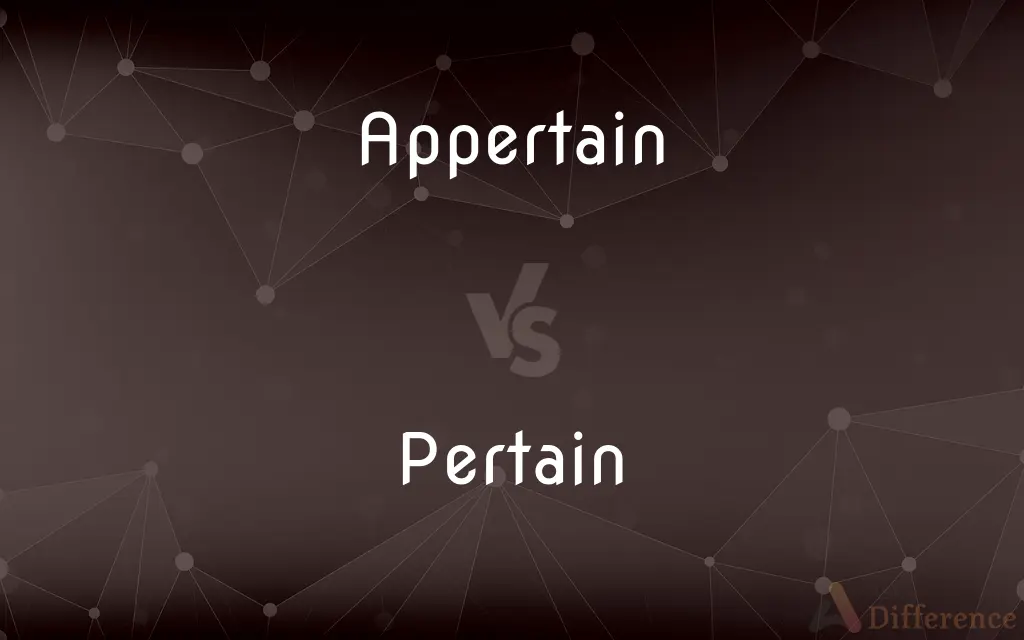Appertain vs. Pertain — What's the Difference?
By Tayyaba Rehman & Urooj Arif — Updated on April 6, 2024
Appertain focuses on belonging or being related to something in a secondary or supplementary way, while pertain directly relates or concerns something primary.

Difference Between Appertain and Pertain
Table of Contents
ADVERTISEMENT
Key Differences
Appertain is often used to describe things that belong to or are connected with something else in a more indirect or supplementary manner. It suggests a relationship that is not essential but is nonetheless associated with a primary subject. Whereas, pertain directly implies a clear, straightforward relevance or connection to the matter at hand. It denotes a primary, inherent, or direct relationship to the subject or context being discussed.
When discussing legal matters, "appertain" might refer to rights or properties that are attached to a more significant entity but are not fundamental to its existence. On the other hand, "pertain" could be used to describe laws or regulations that directly apply to the case or situation at hand, indicating a direct relevance or applicability.
In literary contexts, themes or motifs that appertain might complement the main narrative, enriching the story without being central to the plot. Pertain, in contrast, would describe elements that are crucial to the storyline, directly influencing the direction or outcome of the narrative.
With respect to personal attributes, qualities that appertain to an individual might include their hobbies or interests—elements that contribute to their identity but are not defining characteristics. Pertain, conversely, would refer to intrinsic qualities or characteristics that are fundamental to understanding who the person is.
In the realm of professional skills, abilities that appertain to a job might be useful or beneficial but not essential for the role. Skills that pertain to the job, however, are those that are directly required and critical for successful performance.
ADVERTISEMENT
Comparison Chart
Definition
To belong to or be connected as a secondary part
To be directly related or relevant to something
Relationship Type
Secondary, supplementary
Primary, direct
Usage in Context
Indirect connection or relevance
Direct relevance or concern
Common Contexts
Legal rights, personal attributes
Laws, regulations, essential qualities
Example Usage
"The privileges that appertain to royal status"
"The laws that pertain to copyright"
Compare with Definitions
Appertain
Concerning or regarding in a secondary sense.
The benefits that appertain to club membership.
Pertain
To have a direct relation or relevance to.
The evidence pertains to the defendant's alibi.
Appertain
To relate to or be associated with in a supplementary manner.
The duties that appertain to the office of treasurer.
Pertain
To belong to something as a part, member, or accessory.
The book that pertains to the subject of medieval history.
Appertain
To be appropriate or applicable in a supporting role.
The privileges that appertain to citizens of this country.
Pertain
To belong or be connected as a characteristic or attribute.
The qualities that pertain to a good leader.
Appertain
Connected as a rightful part or attribute.
These documents appertain to the case.
Pertain
To be appropriate, related, or applicable directly.
The rules that pertain to data privacy.
Appertain
To belong to as a function, part, or mode of operation.
The responsibilities that appertain to being a leader.
Pertain
To have reference or relate specifically.
The comments that pertain specifically to the proposed changes.
Appertain
To belong as a proper function or part; pertain
Problems appertaining to social reform.
Pertain
Pertain is a former commune in the Somme department in Hauts-de-France in northern France. On 1 January 2017, it was merged into the new commune Hypercourt.
Appertain
To belong to or be a part of, whether by right, nature, appointment, or custom; to relate to.
Pertain
To have reference or relevance; relate
Evidence that pertains to the accident.
Appertain
To belong as a part, right, possession, attribute, etc.
Pertain
To belong as an adjunct, part, holding, or quality
Skills that pertain to engineering.
Appertain
To belong or pertain, whether by right, nature, appointment, or custom; to relate.
Things appertaining to this life.
Give it unto him to whom it appertaineth.
Pertain
To be fitting or suitable
Conduct that pertains to an officer.
Appertain
Be a part or attribute of
Pertain
(intransitive) To belong to or be a part of; be an adjunct, attribute, or accessory of.
That spare wheel pertains to this car.
Pertain
(intransitive) To relate, to refer, be relevant to.
That question doesn't pertain to the topic, so I'm not going to answer it.
Pertain
(intransitive) To apply; to be or remain in place; to continue to be applicable.
Pertain
To belong; to have connection with, or dependence on, something, as an appurtenance, attribute, etc.; to appertain; as, saltness pertains to the ocean; flowers pertain to plant life.
Men hate those who affect that honor by ambition which pertaineth not to them.
Pertain
To have relation or reference to something.
These words pertain unto us at this time as they pertained to them at their time.
Pertain
Have to do with or be relevant to;
There were lots of questions referring to her talk
My remark pertained to your earlier comments
Pertain
Be a part or attribute of
Common Curiosities
In what contexts is appertain commonly used?
Appertain is often used in legal, cultural, or social contexts to describe rights, privileges, or aspects that are associated with a primary entity but not essential to its definition.
Is pertain used in specific fields or contexts?
Pertain is broadly used across various fields, including law, science, and literature, to indicate direct relevance or applicability to the subject matter.
How does pertain differ from appertain?
Pertain implies a direct, relevant connection to something, whereas appertain suggests a more indirect or supplementary relationship.
Can something pertain and appertain at the same time?
While both terms indicate a form of relationship, their usage typically depends on whether the connection is direct and primary (pertain) or secondary (appertain).
Is pertain considered more formal than appertain?
Both terms are formal, but pertain is more commonly used in both formal and informal contexts due to its direct relevance to subjects.
How is pertain used in academic writing?
In academic writing, pertain is used to indicate direct relevance or essential connection to the topic being discussed.
Can appertain be used in everyday language?
Yes, though less common in casual conversation, appertain can be used to describe secondary relationships or associations.
Do synonyms exist for appertain and pertain?
Yes, synonyms include "relate to," "associate with," and "belong to," but nuances may differ based on context.
Is the use of appertain archaic?
While less common, appertain is not considered archaic and is still used in formal legal, literary, and academic contexts.
What does appertain mean?
Appertain means to belong or be related to something in a secondary or supplementary way.
How does one determine if appertain or pertain is more appropriate?
The choice depends on the nature of the relationship: use appertain for indirect or supplementary connections and pertain for direct relevance.
Can appertain refer to legal rights?
Yes, it can specifically refer to rights or privileges associated with a more significant legal entity or status.
Can appertain imply ownership?
Yes, in a legal context, appertain can imply ownership or entitlement to something as an accessory to a primary entity.
Does pertain always indicate a positive relationship?
Pertain neutrally indicates a direct relationship or relevance, which can be positive, negative, or neutral depending on the context.
Can the use of pertain be ambiguous?
Pertain is generally clear in its indication of direct relevance, though context is key to understanding the specific nature of the relationship.
Share Your Discovery

Previous Comparison
Gale vs. Hurricane
Next Comparison
Expire vs. DieAuthor Spotlight
Written by
Tayyaba RehmanTayyaba Rehman is a distinguished writer, currently serving as a primary contributor to askdifference.com. As a researcher in semantics and etymology, Tayyaba's passion for the complexity of languages and their distinctions has found a perfect home on the platform. Tayyaba delves into the intricacies of language, distinguishing between commonly confused words and phrases, thereby providing clarity for readers worldwide.
Co-written by
Urooj ArifUrooj is a skilled content writer at Ask Difference, known for her exceptional ability to simplify complex topics into engaging and informative content. With a passion for research and a flair for clear, concise writing, she consistently delivers articles that resonate with our diverse audience.














































